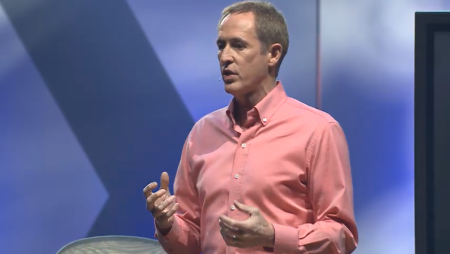Andy Stanley Defends Teaching Methods Against Charges His Approach Undermines Scripture

Pastor Andy Stanley is defending his approach to preaching amid questions from prominent evangelical leaders who contend his methods undermine the Bible's authority and pave the way for unbelief.
In a lengthy article in Outreach magazine on Friday, the pastor of North Point Community Church in Alpharetta, Georgia, responds to his critics and affirms that he believes in biblical inerrancy. What he is doing, he argues, is changing the angle from which he speaks to more effectively engage a post-Christian society, particularly millennials who have left the Church.
Controversy arose in light of Stanley's recent sermon series wherein he argued that because increasing numbers of people in the United States do not lend credence to the Bible, Christians should dispense with the "because the Bible told me so" rationale for believing its truth claims.
Appeals to biblical authority do not translate particularly for millennials who pursue higher education beyond high school, Stanley said.
"The dechurched who grew up in church exit because they find the version of Christianity they've grown up with unconvincing, uninspiring and irrelevant," Stanley said. Moreover, ample evidence exists for the resurrection and the claims Jesus made about Himself even if one does not believe that a worldwide flood took place or Hebrew exodus from Egypt occurred, he said.
But such a tack bothered Southern Baptist Theological Seminary President Al Mohler who wrote last week on his website that defenses of the Christian faith have never been more necessary. And it is impossible to access that faith without the written Word. Stanley, Mohler argued, was "undercutting our only means of knowing Christ and His resurrection from the dead — the Bible," and warned that his approach would inexorably lead to "abject disaster" for the Church.
"This is an apologetic disaster and would leave Christians with no authoritative Scripture. Instead, we would be dependent upon historians (among others) to tell us what parts of both testaments we can still believe," Mohler said.
"Those parts will inevitably grow fewer and fewer. This is what must happen when the total trustworthiness, sufficiency, and authority of the Bible is subverted," Mohler continued.
Nothing could be further from the truth, Stanley replied in response to such charges. Mohler and others, he asserted, have misunderstood him.
Although Scripture does not provide guidelines for ministering to a post-Christian world, Stanley notes that at several times in the New Testament readers witness Peter and Paul operating from a different framework and using different language when speaking to Jews or Gentiles.
In Acts 17, for instance, the Apostle Paul addresses the Athenians, and urges them to repent from their idolatry. Yet although he refers to Him, Paul doesn't mention Jesus by name. To some that might seem like an egregious omission, like Paul was leaving out an essential element of the Gospel, when really he knew his audience's frame of reference.
"To say Paul's approach to the Gentiles in Athens differed from his approach to the Jews in Pisidian Antioch would be the understatement of understatements," Stanley said. "But his central message was the same. God has done something in the world on behalf of all humankind."
Stanley insists he is doing a similar thing today.
"So will you consider retooling in order to win some and save some? Are you willing to take a long, hard look at everything you're currently doing through the eyes of the post-Christian? Are you ready to be a student rather than a critic? We don't have time for tribes. We don't have time for the petty disagreements that only those inside our social media circles understand or care about," Stanley said.
"We're losing ground. The most counterproductive thing we can do is criticize and refuse to learn from one another. So come on. If you believe in the bodily resurrection of Jesus Christ, that's all I need to know. And in light of what's at stake, in light of who is at stake, perhaps that's all you need to know as well," he concluded.





















